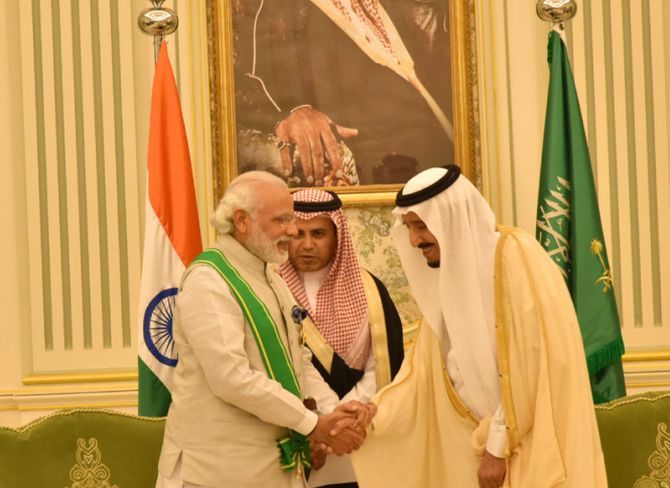The known unknowns in Prime Minister Modi’s Saudi visit assume great significance, says Ambassador M K Bhadrakumar.

While assessing the outcome of Prime Minister Narendra Modi’s visit to Saudi Arabia (April 2-3), the known unknowns assume greater significance than what the joint statement spells out.
Thus, Modi was conferred Saudi Arabia’s “highest civilian honor” -- King Abdulaziz Sash. We know it is a high honour. But we do not know what Modi did to deserve it.
Modi joins a list of recipients who include Silvio Berlusconi, David Cameron, George W Bush, Barack Obama, Vladimir Putin, Abdel Fattah Sissi, Shinzo Abe, Joko Widodo… It is a motley crowd.
The recipients also include three Pakistani generals -- Tariq Majid, formerly chairman of joint chiefs of staff committee, former army chief Pervez Musharraf and current army chief Raheel Sharif.
The Abdulaziz Sash was conjured up only in the ’seventies and Zia-ul-Haq narrowly missed it, despite being the best-ever friend Saudis ever had. But the glaring absence of any of Pakistan’s civilian leaders will be noted. Obviously, Saudis think that power flows through the barrel of the gun in Islamabad.
Interestingly, the recipients also included Ali Shamkhani, formerly Iran’s defence minister (currently heading the National Security Council), a British naval chief, the chief of staff of Japan’s Maritime Self-Defence Force, a NATO commander and a French air chief -- and, intriguingly, a British ambassador by name Alan Munro.
Indeed, Saudis adopt strange criteria. The Arabian king’s wandering mind apparently takes fleeting fancy for someone for reasons best known to him. What could it be about Modi that arrested King Salman’s meandering thoughts -- the 80-year-old monarch suffers from Alzheimer’s -- we do not know.
A second outcome of Modi’s Saudi visit, duly highlighted by our spin doctors, is that the two countries are entering an unprecedented level of cooperation and coordination in the security field in the fight against terrorism. The joint statement devoted four paragraphs to it.
However, a dark cloud has appeared on the horizon in no time, with a Saudi official claiming that they read the joint statement largely as aimed at Iran, which, they believe is fostering terrorism in the region. Of course, our security czars had assumed that Modi brilliantly secured Saudi Arabia’s support in controlling Pakistani state sponsorship of terrorism.
In fact, the Pakistani coverage of Modi’s Saudi visit confirms an impression that Salman may have used Modi’s shoulder to take a pot-shot at the Iranians. Perhaps, that explains why Salman felt so obliged to Modi as to confer the Abdulaziz Sash, our PM’s controversial reputation on the Arab Street as the “butcher of Gujarat” notwithstanding.
Unsurprisingly, adrenaline began flowing in the Saudi veins and they have since imposed new measures against Iran by closing the Saudi air space to Iranian civilian flights and prohibiting tankers carrying Iranian crude from transiting Saudi waters (external links here and here).
Salman probably concluded that with Modi on his side, Iran’s regional “isolation” is now complete. Indeed, the Saudis have offered to Modi that they can replace Iran as India’s key energy partner in the region. They are paranoid about the prospect of an imminent reset of India-Iran ties.
The joint statement says, ‘The two leaders agreed to transform the buyer-seller relationship in the energy-sector to one of deeper partnership focusing on investment and joint ventures in petrochemical complexes, and cooperation in joint exploration in India, Saudi Arabia and in third countries’.
Quite obviously, against the backdrop of Modi’s splash in Riyadh, the visit by Petroleum Minister Dharmendra Pradhan to Teheran (April 6-7) assumes great significance. Pradhan was expected to wrap up an agreement regarding ONGC’s $10 billion integrated project proposal for developing the Farzad-B gas fields in Iran (estimated 12.8 trillion cubic feet of reserves) with options to transport the gas to India either by converting the gas to LNG and transporting it in cryogenic ships or through a subsea pipeline from Chabahar (external link here).
Now, the good part is that King Salman’s charm offensive by conferring on Modi the Abdulaziz Sash has not prevented India from boosting oil imports from Iran. Indian refiners imported 506,100 bpd oil from Iran in March, a jump of about 135 percent from February and the highest level of imports in the past five-year period, Reuters reported on Monday. Tanker data showed the surge came as Reliance Industries resumed purchases after six years of suspension over sanctions. The Indian buyers are being drawn in part by freight discounts that increase as more barrels are purchased.
Conceivably, Modi tried to give verve to the Saudi ties with an eye on Pakistan, while taking care to sequester India’s economic ties with Iran from suffering collateral damage. It is a tight rope walk but, then, Iranians are every bit as pragmatic as Indians. (The text of the Saudi-Indian joint statement is here.)
Image: King Salman bin Abdulaziz Al Saud conferring Saudi Arabia`s highest civilian honour, the King Abdulaziz Sash, on Prime Minister Narendra Modi, at the Royal Court, in Riyadh, Saudi Arabia on April 3, 2016. Photograph courtesy, PIB.
Ambassador M K Bhadrakumar is a retired diplomat, who is widely acknowledged as one of the most authoritative experts on Afghanistan. Mr Bhadrakumar blogs at https://blogs.rediff.com/mkbhadrakumar/











 © 2025
© 2025